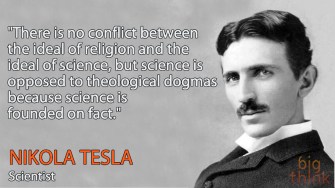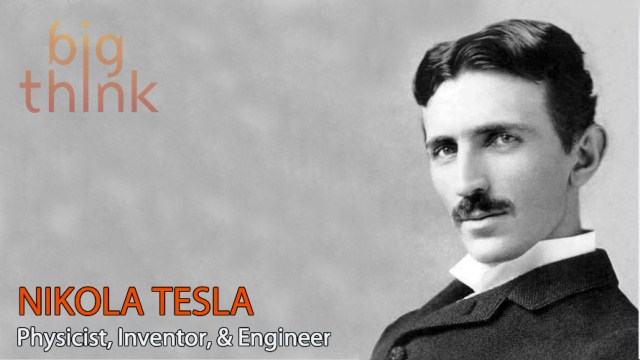Science and Religion are Compatible. Science and Dogma are Not.

Nikola Tesla (1856-1943) was a pioneer scientist during the turn of the 20th century. He was best known for his contributions to the design of the modern alternating current (AC) electricity supply system. Tesla was a physicist, mechanical and electric engineer, inventor and futurist, as well as the possessor of a near-eidetic memory. He spoke eight languages and held 300 patents by the end of his life. His legacy has experienced a major resurgence in recent years — the name Tesla, as you might have heard, is way in vogue right now — as many of his predictions about power and communication have come to fruition.
Tesla was not a particularly religious man, but he had respect for the discipline and sense of meaning at the core of most religions. Below, he explains why science and religion are perfectly compatible… it’s dogma that causes the problem:

“There is no conflict between the ideal of religion and the ideal of science, but science is opposed to theological dogmas because science is founded on fact.”
It’s a shame religion and science tend to be portrayed as always in contention with each other because, deconstructed, they can serve complementary purposes. Sure, religion is more rooted in the pursuit of truth while science is a system of fact-based conjecture, but that doesn’t mean they necessarily have to be mutually exclusive.
Pope Francis, for instance, famously echoed the modern Catholic stance that the Church and science can and should coexist. Many scientists have embraced aspects of Buddhism for its emphasis on personal experience, as well as because science and academia has recently taken a major interest in the effects of mindfulness on the brain.
This is where it’s important to try and form a distinction between the separate spiritual and dogmatic ideals of religion, as Tesla does in the quote above. Religion is, at its best, a set of values by which to live one’s life. It tends to be at its worst when the dogmatic ideals underpinning those values go off the rails. While it’s impossible to completely drive a wedge between spiritualism and dogma, it’s very possible (and common) for believers to subdue the latter enough so that reason can coexist with bits of faith here and there.
For example, consider the belief that evolution and intelligent design are not automatically mutually exclusive. There’s no factual basis for the latter, so scientifically it holds no water, but if someone wants to allow a balance of fact and faith in their personal worldview, more power to them. As long as they don’t allow that faith to interfere with the pursuit (or teaching) of science, or prioritize faith above incontrovertible facts, then there’s no reason why a person can’t be both a student of religion and science.
Science can try to explain how the Big Bang happened. Religion can attempt to deconstruct the spiritual why (or by whom), even if most scientists would argue that it’s a pointless pursuit.
The world is full of Tesla fans and devotees, though the most notable is almost certainly Elon Musk. Check out the video below featuring the Tesla CEO:





